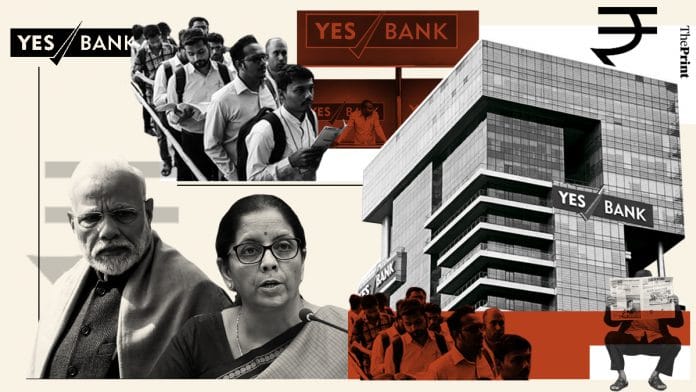The RBI has put Yes Bank under moratorium till 3 April, capping cash withdrawals at Rs 50,000. The crisis at India’s fourth-largest private lender is a reflection of the wider set of problems being faced by India’s banking and financial sector. Finance Minister Nirmala Sitharaman has asked the RBI to look into “what caused these difficulties” and announced state-owned lender SBI’s willingness to invest in Yes Bank.
ThePrint asks: Yes Bank crisis: Has Modi govt done enough to fix financial sector woes to revive economy?
Steps like Mudra scheme, loan melas and waivers have weakened the banking sector
 N R Bhanumurthy
N R Bhanumurthy
Professor, National Institute of Public Finance and Policy
The situation of India’s banking and financial sector has been worsening for a long time now. Deteriorating balance sheets and ambiguity with regard to the treatment of non-performing assets and banking (including co-operatives) regulations have only deepened the problems. Prolonged growth slowdown and weakening fiscal positions of both the Centre and the states have also added to the woes.
While the Modi government, the RBI and the SEBI have been taking various measures — the Insolvency Bankruptcy Code, Prompt Coercive Action (PCA), proposed changes in the Banking Regulation Act, recapitalisation and merger of the PSBs (Public Sector Banks) — it appears that the problems in India’s banking sector are deep-rooted.
The Yes Bank episode suggests that the balance sheet issue is not limited to public sector banks alone, as opposed to what many were thinking. While one hopes that the Yes Bank-type problem would not be contagious, the government and the RBI need to be proactive in stabilising the sector.
Not just hesitancy but measures like Mudra, loan melas and loan waivers taken by governments have also weakened the banking sector. Hesitancy in recapitalisation of banks (no allocations in the recent Union Budget), merger of PSBs, and fear of prosecutions have hindered the growth of public sector banks.
Another structural issue that is hampering the sector is some of the government’s policy measures that actually discourage savings in the economy, which could put pressure on the banking sector performance.
Views are personal
Govt and financial sector regulators are putting in efforts, but the headwinds are too forceful and dynamic
 Ashvin Parekh
Ashvin Parekh
Banking Expert & Managing partner, Ashvin Parekh Advisory Services LLP
The Narendra Modi government and India’s financial sector regulators are putting in efforts. Unfortunately, the headwinds confronting the sector and the Indian economy as a whole are too forceful and dynamic for all stakeholders to fathom.
It appears that many of the measures being taken are taking longer to have an impact, and new situations are arising.
The government and the regulators are seized with these developments and, therefore, we are lurching from one crisis to another.
The problems with India’s financial sector have their roots in a weak banking system, which is only getting weaker by the day. The recovery of non-performing assets is taking longer, and the government is unable to provide capital. New areas of sizeable debt turning bad, such as in the telecom sector, are evolving and fast decision-making is taking particularly longer.
Principle of expecting public sector giants to make up for failures of private banking is fundamentally flawed
 Narendar Pani
Narendar Pani
Professor, National Institute of Advanced Studies
The Yes Bank crisis brings to the forefront the fact that the Narendra Modi government, for all its initiatives in the financial sector, has not confronted the critical aspect of the relationship between public and private institutions.
It is widely believed that before the one-month moratorium ends on 3 April, a consortium of the State Bank of India and the Life Insurance Corporation of India will take over the troubled bank. The depositors in Yes Bank will undoubtedly be relieved if this comes through and the limits on the withdrawal of their own money in the bank are lifted.
For those who have a stake in SBI and LIC there is reason to worry. These two institutions will be expected to bear the burden of the profligacy of Yes Bank’s lending.
But the principle of expecting these public sector institutions to make up for the failures of private banking is fundamentally flawed. It allows private financial institutions to be quite reckless knowing that the public sector will step in to clean the mess they have created. More importantly, if the current economic slowdown pushes more private banks the Yes Bank way, the burden could prove too great even for public sector giants like SBI and LIC.
Govt has been determined to weaken public sector banks, which are the pillars of India’s banking system
 C H Venkatachalam
C H Venkatachalam
General Secretary, All Indian Bank Employees Association
The current NDA government has thoroughly failed to address the issues with India’s economy.
Banks have an important role in reviving the economy. Unfortunately, the government is not doing anything to strengthen our banks. Public sector banks (PSBs) are the pillars of India’s banking system.
Ever since banks were nationalised in 1969, PSBs have contributed immensely to economic development, especially in neglected sectors.
But the Modi government is determined to weaken PSBs. Bad loans is a major issue confronting the banks. Instead of tightening the recovery laws to ensure bad loan recovery, this government believes in resolution of bad loans. The result is huge haircuts for the banks, thus, landing them in losses.
According to the latest Economic Survey, for every rupee that a taxpayer invested in PSBs, he/she lost 23 paise on an average.
The question is about why no timely action was taken in the case of Yes Bank. What was the RBI doing all this while? Instead of strengthening the public sector banks to revive the economy, the government is only helping private-sector lenders, who are also responsible for the bad loans.
Also read: Is Indian economy equipped to deal with the global disruption caused by coronavirus?
By Unnati Sharma, journalist at ThePrint







Core Banking Concept is under serious attack by scams driven by corrupt promoters having nexus with blemished business community and others. Objectives of banking are forced to redirect to non-banking channels, particularly by Private Banks treating it their private property where regulatory authorities all along remained in darkness. ICICI & PMC epitomized as true examples. Every Public Sector Bank runs on the basis of respective set rules envisaged under watch of regulatory regimes. Banking doing business with public money can have little luxury to fish out money in a lackadaisical manner out of business operation that reflects against the core concept of profitability & growth. Early Warning System through various business fundamentals calls for bank to take due diligence well in time to protect banks getting sick. Shareholders need to play a potent role and remain watchful as a whistleblower to act as preventive vigilantes along with control of regulatory authorities. There was time when a business gets sick, promoter of business also gets sick. Now the scenario is completely changed. In present days when business gets sick, promoters become financially much more sound with allied forces. Why does it happen? A country can hardly move forward in the given circumstances unless such anarchist mindset does die down. Growth with profitability of economy needs a collective approach examining What is Right; not Who is Right. Sideline players must look inwardly with positive & inclusive approaches. Undue government pressures on SBI,LIC matter in the instant case just as a short term remedy but carefully being examined letting not to end up in crisis. Consortium means sharing of risks among lenders in the event of huge financial exposure to a business unit that bars a Bank to lend with a limit in comparison to percentiles of Capital. But it’s case of taking over of a business unit at its existing status from potential collapse, not just a merger. So, it deserves for examination by appropriate authorities.
May not be adequate. SBI will bring in Rs.2450 cr at Rs.10 per share (Rs.2 face value +Rs.8 premium). This means 245 cr shares. Existing paid up capital is Rs.463 cr or 231.5 cr shares. Both add up to around 490 cr shares. The authorised capital of the new entity will be Rs5000 cr or 2500 cr shares. Thus there is lot of room to induct other banks to invest in Yes Bank. SBI should form a consortium and the burden should not fall on SBI alone.
Has Modi govt done enough to fix financial sector woes to revive economy?Why do they ask obvious question, answer to which is known all over India. They have not solved and they do not have people to fix such a mess. 10 Joint secretary recruited for no use. It is not them it is Modi ghodi driving with no driving license
Let me put it the other way. A sputtering economy is itself hurting the financial sector and the banks. Apart from NPAs and legacy issues dating from UPA II, the growing weakness in the economy is eroding the profitability of banks. There are fewer healthier borrowers who can sustain credit growth and service their loans. Real estate is an especially painful example. For that matter, difficult to think of a single industry / sector that is booming. 2. It is not the government’s job to tell the depositors of private or cooperative banks that their money is safe. LIC and SBI hain na, aap sab ki madat karne ke liye. Merging weak banks with the relatively stronger ones. Shuffling the deck chairs around. 3. There is a growing malaise in the economy. A weak financial s sector is both cause and effect.